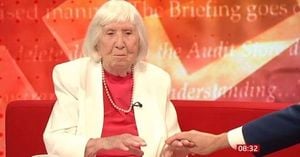Elon Musk, the billionaire entrepreneur behind Tesla, has recently found himself at the center of controversy, with accusations from the director of the 2004 sci-fi film I, Robot alleging he copied design elements for Tesla’s new prototypes. The stir began during Tesla's "We, Robot" event, where Musk presented the company's latest innovations, including the Cybercab—a futuristic vehicle equipped with winged doors and no traditional controls like steering wheels or pedals. Along with the Cybercab, he also unveiled Tesla's upcoming Optimus robots and the driverless Robovan, which had drawn significant attention both for their ambitious technology and their resemblance to concepts from I, Robot.
Alex Proyas, the director of I, Robot, took to social media to express his discontent, saying, "Hey Elon, can I have my designs back please?" This post quickly garnered over 6 million views, provoking reactions from fans and industry insiders alike. Proyas pointed out the similarities between Tesla's new robots and the designs featured in his 2004 film, which stars Will Smith as a detective grappling with the ethical dilemmas of robotic assistance.
During the presentation, the products showcased appeared eerily familiar to those from the movie. For example, the Cybercab bore close resemblance to the self-driving vehicles depicted on screen, and the Robovan echoed the delivery drones featured throughout Proyas's narrative. The event seemed to play with the film’s title, echoing key themes from the plot which caution against the unchecked advancement of artificial intelligence.
Patrick Tatopoulos, the production designer for I, Robot, also took notice of the alleged borrowing. He shared side-by-side images on social media to highlight the visual parallels, remarking humorously, "Maybe it is just me, or should I feel honored they found inspiration from my designs?" Meanwhile, Matt Granger, who worked as Proyas's assistant, chimed in with his own post, vocally criticizing Musk's creativity. "I too wish to offer my full-fingered 'f@$k you' to Elon and his utter lack of creativity," he declared, intensifying the discussion around originality at Tesla.
Critics online quickly emerged to counter Proyas’s claims, noting how I, Robot itself was inspired by earlier works of science fiction. Some commenters cited the representation of female cyborgs from Fritz Lang’s classic film Metropolis (1927), noting the persistent thematic exploration of humanoid robots and automobiles throughout cinema history. This debate brings to light an often-debated question: Do tech companies draw inspiration from science fiction? Musk himself has previously acknowledged influences from other sci-fi literature, including Douglas Adams's The Hitchhiker's Guide to the Galaxy.
At the same time, Musk’s event showcased more than just product launches; it sparked discussions around the blurry lines between innovation and inspiration. Some fans celebrated the merger of cinematic vision with practical technology, highlighting the cultural dialogue about automation and robotics. Support for Musk flowed from fans who admired his ambition and out-of-the-box thinking.
The timing of the event was notable, occurring as Tesla aimed to solidify itself as a leader not only in electric vehicles but also in the burgeoning field of autonomous robotics. The introduction of these designs came on the heels of significant developments within the company, as Musk has spearheaded efforts to revolutionize transportation through automation.
This isn’t the first time Musk has faced allegations of design replication. Several instances within the tech industry have spotlighted the blurred lines of originality, where the boundaries of inspiration versus imitation continue to spark debate. The question remains as to whether Proyas's criticisms will lead to tangible repercussions for Musk or Tesla.
The ripple effects of this controversy will likely be felt across both the tech and entertainment industries, continuing to fuel discussions around originality and the debt we owe to our cultural past as we venture forward in technological innovation. With each advancement, the story of progress becomes intertwined with the shared narratives of imagination, creativity, and sometimes, contention.
Now, as the dust settles on what may just be yet another chapter of Musk's storied career, the discussions he ignited remind us of the power of interpretation and the dynamic relationship between literature, cinema, and technology. Amidst the pixels and steel of modern innovation, the shadows of past imaginations loom large, whether they are acknowledged or not. Is it true inspiration or mere coincidence? Only time and perhaps the courts will tell.



